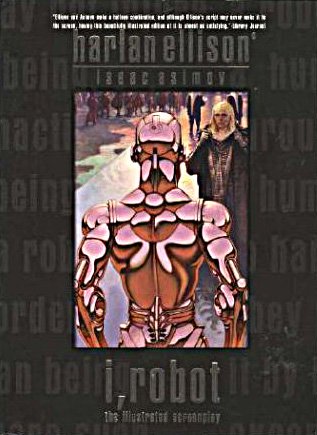- Date: 05.08.2008
- Book: I, Robot: The Illustrated Screenplay
- Author: plappen
Review
I, Robot: The Illustrated Screenplay, Harlan Ellison and Isaac Asimov, 2004, ISBN 0743486595This is Ellisons script, written in the late 1970s, for a full-length movie incorporating several of Asimovs classic I, Robot stories.
The essay which begins this book is not as vitriolic as some others of Ellisons, but it pulls no punches in chronicling the scripts journey through Hollywood. The process was characterized by delay after delay. The script was supposedly impossible to film. At one point, Ellison realizes that a certain studio executive, with the power to say Yes or No to the project, hadnt even read the script, despite being given many months to do so. At another point, Ellison is asked to make the robots cute like C-3PO (this is the era of Star Wars), something he refused to do. Eventually, all of the options are used up and the script is never put into production. It is decided to get some use out of the script and it is later published in Isaac Asimovs Science Fiction Magazine.
The story concerns robot psychologist Susan Calvin. Her life story is the history of robotics. A reporter named Bratenahl is told to find the answer to the question Who is Susan Calvin? Now an old woman, she has become very secretive. Bratenahl talks to people who knew Calvin and worked with her in the past. One remembrance is when the Calvin family had a robot as a part time playmate for six-year-old Susan. Her father worked for US Robotics, but her mother was not convinced that a robot in the house was a good idea. The robot was seven feet tall, and could break Calvin like a toothpick if it so desired. One day, the robot is sent away, permanently.
Another remembrance is about a robot who could read minds, and who interpreted the Three Laws of Robotics (programmed into every robot) in an unexpected way. A third memory of Calvin is about the time she was part of a manned mission to Mercury. A certain element, available on the surface, is vital if the ship is going to leave Mercury, and return to Earth. Its far enough away so that a human will not make it back to the ship without burning up in the sunlight of Mercury, so a robot is dispatched. Having received unclear instructions, the Second and Third Laws of Robotics cause the robot to go temporarily cuckoo. Calvin goes out on the surface, and almost dies, but fixes the robot, and they are able to leave Mercury.
If filmed as written, this would have made a great film. Its interesting and complex, the characters are real people, and, best of all, it doesnt rely on sex, violence or car chases. Highly recommended.
Recent actions
-
toryah1988 has added Harry Potter And The Order Of The Phoenix to their read list.
-
toryah1988 has added Harry Potter And The Goblet Of Fire to their read list.
-
toryah1988 has added Atonement to their read list.
-
toryah1988 has added New Moon (The Twilight Saga) to their read list.
-
Monica has added The Da Vinci Code (Large Print) to their wish list.
